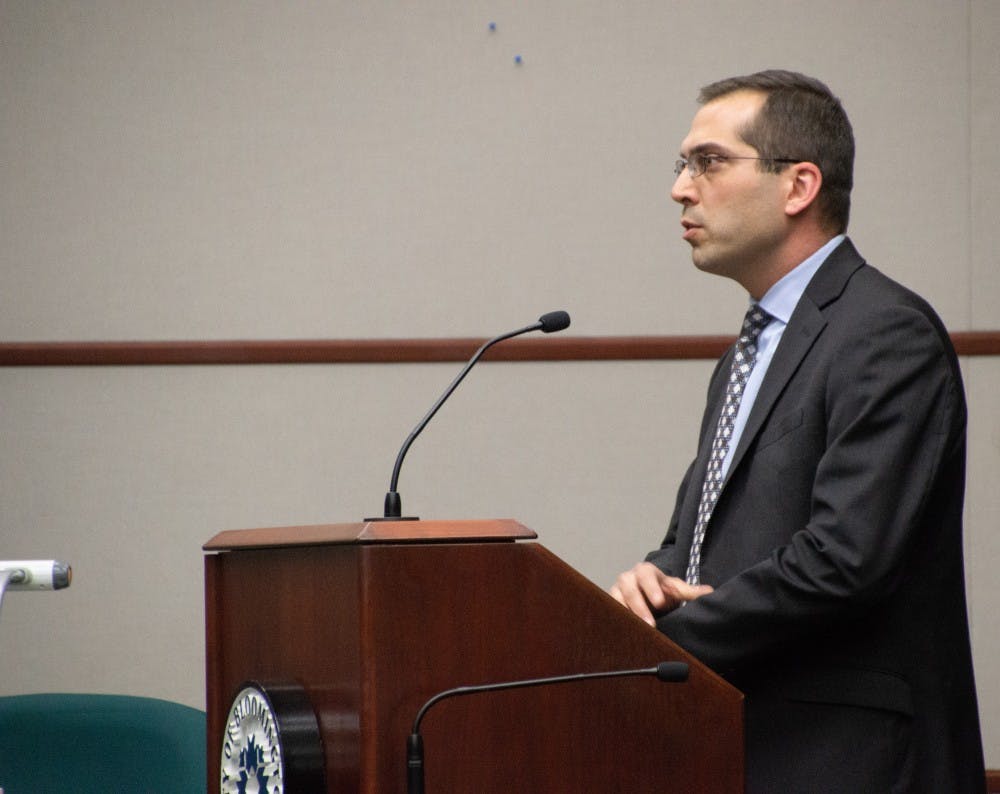The Bloomington City Council discussed the city’s proposed e-scooter regulation ordinance Wednesday night. The ordinance would replace the agreements the city currently has with scooter companies Lime, Bird and soon-to-come Spin.
The regulations include required city-issued licenses that scooter companies must obtain to operate, rules on parking, use, safety, sending data of scooter use to the city, required public outreach and rules on enforcement.
The council is scheduled to make amendments and vote on the ordinance next week.
Much of the proposed ordinance consists of rules for scooter use and parking and the fines for riders and companies that will be used to enforce these rules.
Representatives from the transportation and planning department, a representative from Lime scooters, doctors from the IU Health Center and the IU Health Bloomington Hospital and residents came to the meeting Wednesday night to share their opinions on scooters.
The ordinance would require riders to dismount on certain pedestrian-heavy areas of downtown including Kirkwood Avenue from Indiana Avenue to Morton Street, Fourth Street from Indiana Avenue to Grant Street and the downtown portions of Walnut Street, Sixth Street and College Avenue.
In all other areas, however, scooters would be allowed on sidewalks if riders pass pedestrians at a distance of at least three feet. The ordinance also allows riders to park scooters on sidewalks outside of downtown as long as there’s a clear pathway of 54 inches.
For Kaleb Crain, a Bloomington man who relies on a motorized wheelchair to move around, allowing scooters on sidewalks is dangerous. Crain said he recently fell out of his wheelchair and injured himself from trying to navigate around a scooter parked on a sidewalk. He also added that some wider wheelchairs would not be able to fit through the required 54 inches of space.
“They have become a problem and a nuisance, and that is putting it very, very lightly,” Crain said.
Dr. Beth Rupp, staff physician and medical director of the IU Health Center, came to express her concern for the safety of students. She said the health center saw 38 students come in for scooter-related injuries in October alone.
“We’re very concerned that these scooters are making Bloomington and specifically IU’s campus less safe,” Rupp said.
Dr. Dan Handel from IU Health Bloomington Hospital said the hospital has had to transport multiple patients with scooter-related injuries to Indianapolis because of the severity of their injuries.
Many council members requested data on scooter injuries and use, but no scientifically collected data could be offered because of the novelty of the scooters locally and nationally. Council member Stephen Volan, who worked with the city to draw up the regulations, said it was hard to find communities similar in size to Bloomington with effective scooter regulation.
“It’s a technology that has really emerged in the past year,” Volan said. “Everyone is coasting in the dark.”
Christine Missik, 62, has ridden her own personal scooters for over six years and sees the sidewalk as the safest place to ride. She said she always slows down to pedestrian pace when she’s around people and suggested a slower speed in the downtown area instead of a dismount zone.
“Cars kill,” Missik said. “Every year people die from car accidents.”
Many council members doubted that enforcements, such as a $20 fine for illegal scooter use and a $30 fine that would eventually rise to $60 for illegal scooter parking, would be executed regularly enough with the ratio of officers to scooters.
Council member Chris Sturbaum suggested hiring additional personnel to regulate scooters using money from licensing fees that scooter companies will have to pay.
Some council members questioned the benefits of scooters to Bloomington and asked if the city could legally ban them altogether.
Alex Crowley, director of the Economic and Sustainable Development department, made it clear that the city wants to keep scooters in Bloomington.
“It’s the administration’s opinion that this technology can be jarring at first,” Crowley said. “But things like scooters and bike shares are all part of a fabric of options that reduce single-occupancy vehicle usage.”




